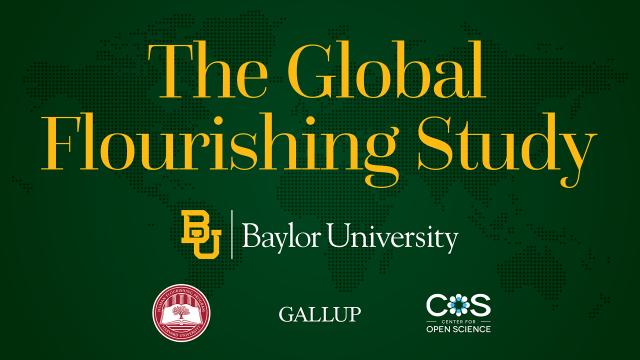
1) The Global Flourishing Study (GFS) is a new project conducted jointly by Baylor University’s Institute for Studies of Religion and Program on Pro-Social Behavior and Harvard University’s Human Flourishing Project, that will look at the factors shaping human betterment, including its religious dimensions. The project will involve data collection from some 240,000 participants from 22 countries, with annual data collection from the same individuals for five years. The survey includes questions on well-being, along with demographic, social, economic, political, religious, personality, childhood, community, health, and character-based questions. The GFS will expand knowledge on the extent to which many of the world’s largest nations are or are not flourishing. The study will be of special interest to religious communities, since it will survey respondents not only on religious affiliation and congregational attendance but also a wide range of variables on religion and spirituality, such as rituals, religious experiences, and views of good and evil. (Source: International Bulletin of Mission Research, online in February)

2) J.C. is the first virtual, artificial intelligence (AI) gospel artist. The AI was created by Marquis Boone Enterprises last November, using software algorithms to recognize voice patterns and replicate them, eventually creating new ones. Boone and colleagues plan to feature J.C. as an entertainer in the so-called “metaverse,” an enhanced version of social media where virtual reality creates an “embodied Internet.” Since the pandemic, churches have been experimenting with virtual reality, where real social actors inhabit an artificial computer-generated reality. Boone said he got the idea of creating a virtual-reality AI gospel music artist after hearing about AI artists in the pop music genre. Critics say that an AI gospel artist misses the point that Christian music should be about human connection rather than programming and marketing that mimics secular entertainment trends. Boone answers that such criticism has followed every new trend in Christian music, though he acknowledges that it may be difficult to overcome what is called the “uncanny valley” in any AI form. This is when the AI is so close to humans that it causes revulsion among its users. (Source: Christianity Today, March)

3) The ReAwaken America tour is the clearest example of how Christian nationalism or populism, however vague and contested these terms, can be seen as a movement active in a segment of evangelical and charismatic churches. Launched during the Biden administration by former General Michael Flynn, the tour features conferences combining “elements of a tent revival, a trade fair and a sci-fi convention.” Most news accounts have noted the “extremist” nature of these events, which have included more than one person calling for the hanging of his political opponents. What is most striking is Flynn’s use of Christian channels and venues to spread an apocalyptic message of election corruption and national decline. The tour is sponsored by Charisma News, a charismatic Christian outlet that was strongly supportive of the Trump presidency. The list of upcoming venues on Flynn’s website consists largely of evangelical and especially charismatic churches. The tour is concentrated in smaller churches, most removed from elite American culture, including from elite evangelicalism and larger megachurches. The tour has yet to receive much critical treatment by conservative Christian leaders or Christian media. Critics charge that such leaders feel that, however extreme Flynn and his message may be, it is less dangerous than “wokeism” or the worst of the left: “desperate for the unity that is perceived as necessary to confront existential risks, the last thing they want to do is to divide the right.”
(Source: David French, The Dispatch, February 13)

Source: Green Pass News.